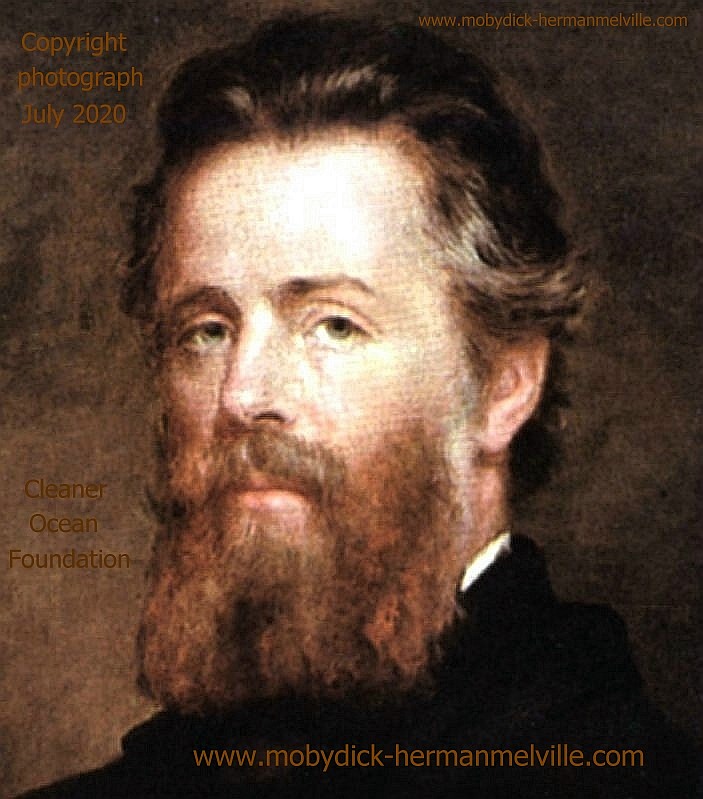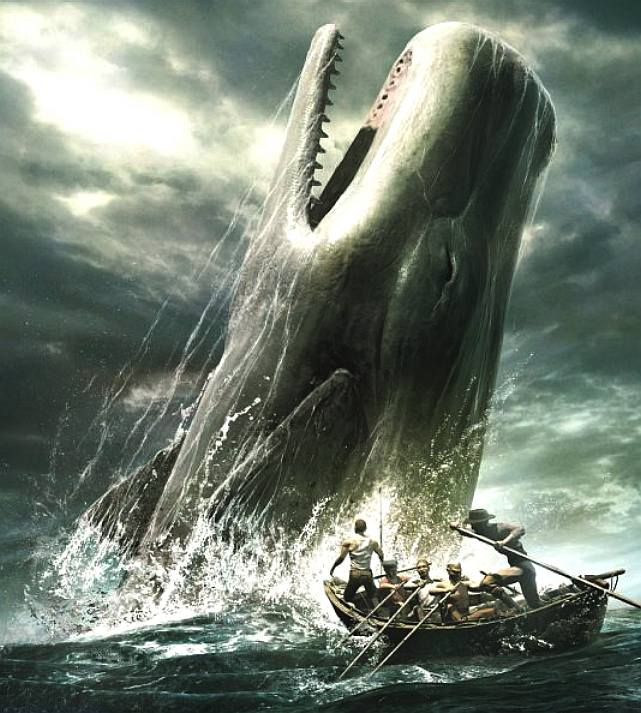
Herman
Melville was the author of a story about what we'd now consider an illegal activity,
the commercial hunting of whales for oil and meat. Whaling is still
carried out by Japan, Iceland and Canada, among other nations, though
most nations voluntarily abstain in the interests of conserving these
magnificent animals - as per International
Whaling Commission guidelines.
Back
<<<
CHAPTER 84. Pitchpoling.
To make them run easily and swiftly, the axles of carriages are anointed; and for much the same purpose, some whalers perform an analogous operation upon their boat; they grease the bottom. Nor is it to be doubted that as such a procedure can do no harm, it may possibly be of no contemptible advantage; considering that oil and water are hostile; that oil is a sliding thing, and that the object in view is to make the boat slide bravely. Queequeg believed strongly in anointing his boat, and one morning not long after the German ship Jungfrau disappeared, took more than customary pains in that occupation; crawling under its bottom, where it hung over the side, and rubbing in the unctuousness as though diligently seeking to insure a crop of hair from the craft's bald keel. He seemed to be working in obedience to some particular presentiment. Nor did it remain unwarranted by the event.
Towards noon whales were raised; but so soon as the ship sailed down to them, they turned and fled with swift precipitancy; a disordered flight, as of Cleopatra's barges from Actium.
Nevertheless, the boats pursued, and Stubb's was foremost. By great exertion, Tashtego at last succeeded in planting one iron; but the stricken whale, without at all sounding, still continued his horizontal flight, with added fleetness. Such unintermitted strainings upon the planted iron must sooner or later inevitably extract it. It became imperative to lance the flying whale, or be content to lose him. But to haul the boat up to his flank was impossible, he swam so fast and furious. What then remained?
Of all the wondrous devices and dexterities, the sleights of hand and countless subtleties, to which the veteran whaleman is so often forced, none exceed that fine manoeuvre with the lance called pitchpoling. Small sword, or broad sword, in all its exercises boasts nothing like it. It is only indispensable with an inveterate running whale; its grand fact and feature is the wonderful distance to which the long lance is accurately darted from a violently rocking, jerking boat, under extreme headway. Steel and wood included, the entire spear is some ten or twelve feet in length; the staff is much slighter than that of the harpoon, and also of a lighter material—pine. It is furnished with a small rope called a warp, of considerable length, by which it can be hauled back to the hand after darting.
But before going further, it is important to mention here, that though the harpoon may be pitchpoled in the same way with the lance, yet it is seldom done; and when done, is still less frequently successful, on account of the greater weight and inferior length of the harpoon as compared with the lance, which in effect become serious drawbacks. As a general thing, therefore, you must first get fast to a whale, before any pitchpoling comes into play.
Look now at Stubb; a man who from his humorous, deliberate coolness and equanimity in the direst emergencies, was specially qualified to excel in pitchpoling. Look at him; he stands upright in the tossed bow of the flying boat; wrapt in fleecy foam, the towing whale is forty feet ahead. Handling the long lance lightly, glancing twice or thrice along its length to see if it be exactly straight, Stubb whistlingly gathers up the coil of the warp in one hand, so as to secure its free end in his grasp, leaving the rest unobstructed. Then holding the lance full before his waistband's middle, he levels it at the whale; when, covering him with it, he steadily depresses the butt-end in his hand, thereby elevating the point till the weapon stands fairly balanced upon his palm, fifteen feet in the air. He minds you somewhat of a juggler, balancing a long staff on his chin. Next moment with a rapid, nameless impulse, in a superb lofty arch the bright steel spans the foaming distance, and quivers in the life spot of the whale. Instead of sparkling water, he now spouts red blood.
"That drove the spigot out of him!" cried Stubb. "'Tis July's immortal Fourth; all fountains must run wine today! Would now, it were old Orleans whiskey, or old Ohio, or unspeakable old Monongahela! Then, Tashtego, lad, I'd have ye hold a canakin to the jet, and we'd drink round it! Yea, verily, hearts alive, we'd brew choice punch in the spread of his spout-hole there, and from that live punch-bowl quaff the living stuff."
Again and again to such gamesome talk, the dexterous dart is repeated, the spear returning to its master like a greyhound held in skilful leash. The agonized whale goes into his flurry; the tow-line is slackened, and the pitchpoler dropping astern, folds his hands, and mutely watches the monster die.
Next
>>>
BOOK
CHAPTERS
CHAPTER 1. Loomings.
CHAPTER
2. The Carpet-Bag.
CHAPTER
3. The Spouter-Inn.
CHAPTER
4. The Counterpane.
CHAPTER
5. Breakfast.
CHAPTER
6. The Street.
CHAPTER
7. The Chapel.
CHAPTER
8. The Pulpit.
CHAPTER
9. The Sermon.
CHAPTER
10. A Bosom Friend.
CHAPTER
11. Nightgown.
CHAPTER
12. Biographical.
CHAPTER
13. Wheelbarrow.
CHAPTER
14. Nantucket.
CHAPTER
15. Chowder.
CHAPTER
16. The Ship.
CHAPTER
17. The Ramadan.
CHAPTER
18. His Mark.
CHAPTER
19. The Prophet.
CHAPTER
20. All Astir.
CHAPTER
21. Going Aboard.
CHAPTER
22. Merry Christmas.
CHAPTER
23. The Lee Shore.
CHAPTER
24. The Advocate.
CHAPTER
25. Postscript.
CHAPTER
26. Knights and Squires.
CHAPTER
27. Knights and Squires.
CHAPTER
28. Ahab, Captain.
CHAPTER
29. Enter Ahab; to Him, Stubb.
CHAPTER
30. The Pipe.
CHAPTER
31. Queen Mab.
CHAPTER
32. Cetology.
CHAPTER
33. The Specksnyder.
CHAPTER
34. The Cabin-Table.
CHAPTER
35. The Mast-Head.
CHAPTER
36. The Quarter-Deck.
CHAPTER
37. Sunset.
CHAPTER
38. Dusk.
CHAPTER
39. First Night Watch.
CHAPTER
40. Midnight, Forecastle.
CHAPTER
41. Moby Dick.
CHAPTER
42. The Whiteness of The Whale.
CHAPTER
43. Hark!
CHAPTER
44. The Chart.
CHAPTER
45. The Affidavit.
CHAPTER
46. Surmises.
CHAPTER
47. The Mat-Maker.
CHAPTER
48. The First Lowering.
CHAPTER
49. The Hyena.
CHAPTER
50. Ahab's Boat and Crew. Fedallah.
CHAPTER
51. The Spirit-Spout.
CHAPTER
52. The Albatross.
CHAPTER
53. The Gam.
CHAPTER
54. The Town-Ho's Story.
CHAPTER
55. Of the Monstrous Pictures of Whales.
CHAPTER
56. Of the Less Erroneous Pictures of Whales, and the True
CHAPTER
57. Of Whales in Paint; in Teeth; in Wood; in Sheet-Iron; in
CHAPTER
58. Brit.
CHAPTER
59. Squid.
CHAPTER
60. The Line.
CHAPTER
61. Stubb Kills a Whale.
CHAPTER
62. The Dart.
CHAPTER
63. The Crotch.
CHAPTER
64. Stubb's Supper.
CHAPTER
65. The Whale as a Dish.
CHAPTER
66. The Shark Massacre.
CHAPTER
67. Cutting In
CHAPTER
69. The Funeral.
CHAPTER
70. The Sphynx.
CHAPTER
71. The Jeroboam's Story.
CHAPTER
72. The Monkey-Rope.
CHAPTER
73. Stubb and Flask Kill a Right Whale; and Then Have a Talk
CHAPTER
74. The Sperm Whale's Head—Contrasted View.
CHAPTER
75. The Right Whale's Head—Contrasted View.
CHAPTER
76. The Battering-Ram.
CHAPTER
77. The Great Heidelburgh Tun.
CHAPTER
78. Cistern and Buckets.
CHAPTER
79. The Prairie.
CHAPTER
80. The Nut.
CHAPTER
81. The Pequod Meets The Virgin.
CHAPTER
82. The Honour and Glory of Whaling.
CHAPTER
83. Jonah Historically Regarded.
CHAPTER
84. Pitchpoling.
CHAPTER
85. The Fountain.
CHAPTER
86. The Tail.
CHAPTER
87. The Grand Armada.
CHAPTER
88. Schools and Schoolmasters.
CHAPTER
89. Fast-Fish and Loose-Fish.
CHAPTER
90. Heads or Tails.
CHAPTER
91. The Pequod Meets The Rose-Bud.
CHAPTER
92. Ambergris.
CHAPTER
93. The Castaway.
CHAPTER
94. A Squeeze of the Hand.
CHAPTER
95. The Cassock.
CHAPTER
96. The Try-Works.
CHAPTER
97. The Lamp.
CHAPTER
98. Stowing Down and Clearing Up.
CHAPTER
99. The Doubloon.
CHAPTER
100. Leg and Arm.
CHAPTER
101. The Decanter.
CHAPTER
102. A Bower in the Arsacides.
CHAPTER
103. Measurement of The Whale's Skeleton.
CHAPTER
104. The Fossil Whale.
CHAPTER
105. Does the Whale's Magnitude Diminish?—Will He Perish?
CHAPTER
106. Ahab's Leg.
CHAPTER
107. The Carpenter.
CHAPTER
108. Ahab and the Carpenter.
CHAPTER
109. Ahab and Starbuck in the Cabin.
CHAPTER
110. Queequeg in His Coffin.
CHAPTER
111. The Pacific.
CHAPTER
112. The Blacksmith.
CHAPTER
113. The Forge.
CHAPTER
114. The Gilder.
CHAPTER
115. The Pequod Meets The Bachelor.
CHAPTER
116. The Dying Whale.
CHAPTER
117. The Whale Watch.
CHAPTER
118. The Quadrant.
CHAPTER
119. The Candles.
CHAPTER
120. The Deck Towards the End of the First Night Watch.
CHAPTER
121. Midnight.—The Forecastle Bulwarks.
CHAPTER
122. Midnight Aloft.—Thunder and Lightning.
CHAPTER
123. The Musket.
CHAPTER
124. The Needle.
CHAPTER
125. The Log and Line.
CHAPTER
126. The Life-Buoy.
CHAPTER
127. The Deck.
CHAPTER
128. The Pequod Meets The Rachel.
CHAPTER
129. The Cabin.
CHAPTER
130. The Hat.
CHAPTER
131. The Pequod Meets The Delight.
CHAPTER
132. The Symphony.
CHAPTER
133. The Chase—First Day.
CHAPTER
134. The Chase—Second Day.
CHAPTER
135. The Chase.—Third Day.
Epilogue

Moby
Dick is the antogonist in this story of a great white 'bull' sperm whale that fought back at
whalers who tried to harpoon him.
The idea came to
Herman Melville after
he spent time on a commercial whaler, where stories abounded of the
sinking of the Essex in 1821 and Mocha
Dick, a giant sperm whale that sank around 20 ships, before being
harpooned in 1838.
Herman
realised how fixated the sailors became, and he also became with the
thought that there was a whale that nobody could catch, that represented
a real risk to the whalers hunting whales, in that it was more sport
than commercial operations.
Without
any doubt this is one of the greatest novels coming out of America at
this time and way off the beaten track, making it so interesting,
reflecting the state of whaling and the economic importance in the
developing the nation - giving the general public a taste of something
adventurous that most people never think about.
Many
films and graphic novel adaptations have been inspired by the writings
of Herman Melville, from Marvel
and Disney
comics with good cause.
One
such production in 2020 is a graphic novel about a giant humpback whale
called Kulo
Luna, that sinks a modern whaling boat, much as depicted in Herman
Melville's Moby
Dick, except that is this day and age whales have explosive harpoons
to contend with, and sonar, from which there is no escape.
Please use our
A-Z INDEX to
navigate this site

